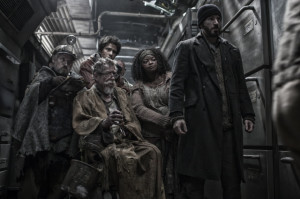
The dystopian sci-fi thriller Snowpiercer, director Bong Joon-Ho’s first English-language release, takes place 17 years after a geo-engineering scheme to stop global warming catapulted the Earth into an ice age in — that’s right — July 2014. Virtually everyone on the planet freezes to death, with the few hundred survivors left to either buy tickets to or push their way onto a train that can shelter them for seemingly forever.
The catch is that the ticketing system instantaneously creates a class hierarchy both mimicking and intensifying the one that presumably existed before the disaster. Those who can afford to buy their way on enjoy sushi and nightclubs in the front of the train while everyone else subsists on gelatinous protein blocks in the cramped last few cars of its tail end — a rolling, heavily policed slum.
Though ostensibly controlled by Wilfred, an elusive corporate magnate, the train actually functions by exploiting the labor of those in the tail, who are forcefully told to be grateful that they made it on at all.
The plot revolves around a group of tail residents who wage a revolution to seize the engine from Wilfred. As the film’s protagonist Curtis notes, “All other revolutions failed because they couldn’t take the engine.” Played by none other than Captain America himself Chris Evans, Curtis takes on something of a cult hero status as the film progresses, being only somewhat reluctantly pushed to take on the mantle of revolutionary leadership by his underclass brethren.
It’s rare that a blockbuster manages to tie together themes of inequality and environmentalism; Children of Men may have been the last to do it so well. One of Snowpiercer’s clearest points is how interconnected the climate crisis is to the logic of capitalism, and how weary we should be of solutions that stem from it. In an interview with i09, Bong — a former student activist and member of South Korea’s socialist New Progressive Party — says explicitly that “it’s not humans per se, but capitalism that’s destroying the environment.”
Excitingly, the film gives viewers two false solutions to mull over: market-oriented geo-engineering intended to maintain the status quo, and a revolution only interested in seizing power at the expense of building it. Throughout the film, there’s little hope that life on the train will actually get better, no matter how successful the tail revolt. A surface level reading of Snowpiercer might take the fatalist stance that “we all live on a doomed train.” Like the most eerie moments of the reimagined Battlestar Galactica, the feeling builds throughout the film that any attempt at either escape or upheaval within the train is a fool’s errand. But Bong’s point is more subtle, even if his politics aren’t. Confronting the climate crisis means confronting capitalism and the inequality it produces: It’s literally impossible to do one without the other — so do it right.
Peter Frase wrote an excellent review for Jacobin describing the parallels between “the Curtis Revolution” and the limits of Soviet Communism and social democracies that failed to genuinely transform the systems they seized. The same warning should be given to those looking to fight climate change, or at the very least survive it. In the words of Audre Lorde, “the master’s tools will never dismantle the master’s house.”
Like the Hunger Games, Snowpiercer succeeds not only as a ripe political text but also as a slick blockbuster. Films as compelling and well made as this one have the potential to speak to a mass audience in ways that few leftists can, which — even if the film isn’t to your liking — is something to pay serious attention to. Just last month, the ruling junta in Thailand banned Katniss Everdeen’s infamous three-finger salute after it sprang up as a symbol of the country’s pro-democracy movement. While it’s difficult to predict what mainstream conversations around Snowpiercer will produce, we can at least hope that its popularity is a sign of things to come.

“It’s not humans per se, but capitalism that’s destroying the environment.” Haha, nice fantasy but, not really…it’s humans. Humans have been destroying their environment since they climbed down from trees and started playing with fire. As soon as they left Africa and migrated to other continents, they slaughtered the megafauna, and drove them to extinction. Our behavior is hard-wired – grow and grow and grow until we hit overshoot and collapse…nothing new in this pattern except now we have filled the earth, and so the collapse on the horizon will be global. The other species will say, don’t let the door slam you on the ass on your way out.
Thanks for this review. It made me want to see the film and I’m glad I seized the opportunity. It is definitely a thought-provoking one and I highly recommend watching it with activist friends and discussing afterward.